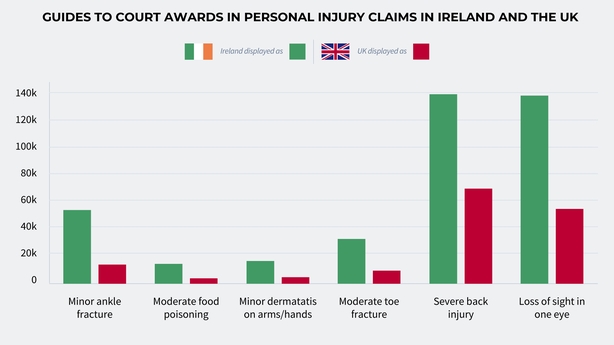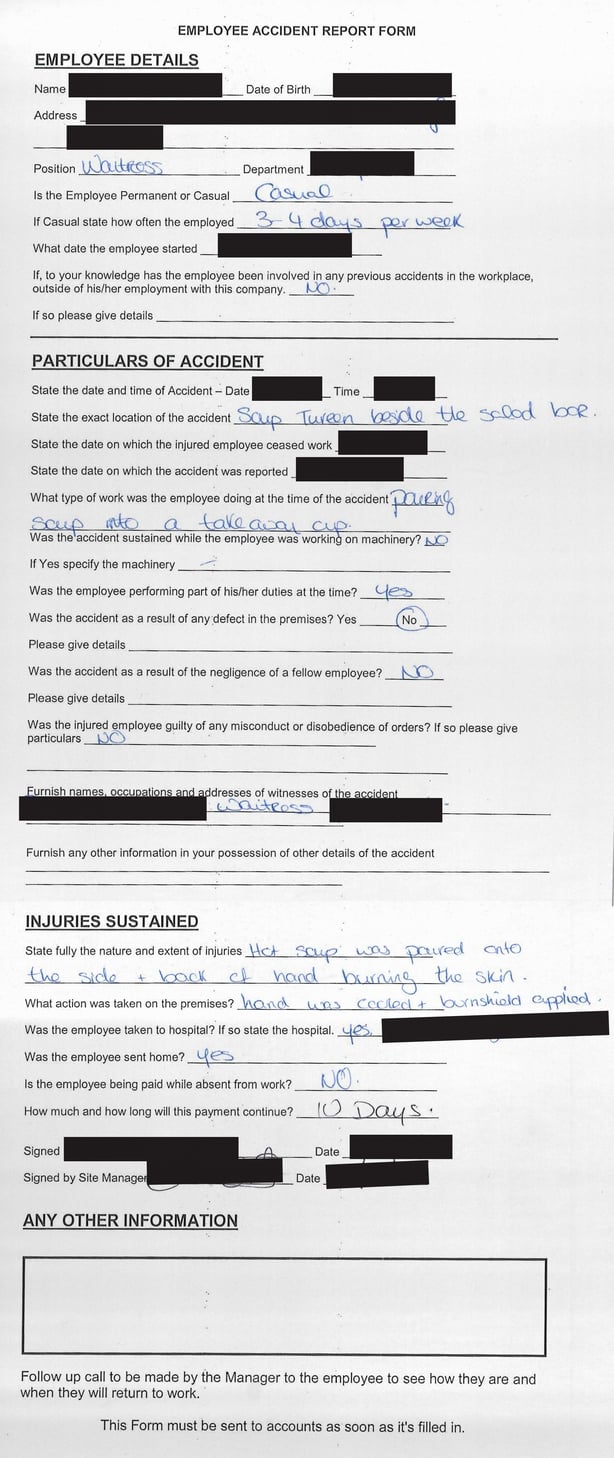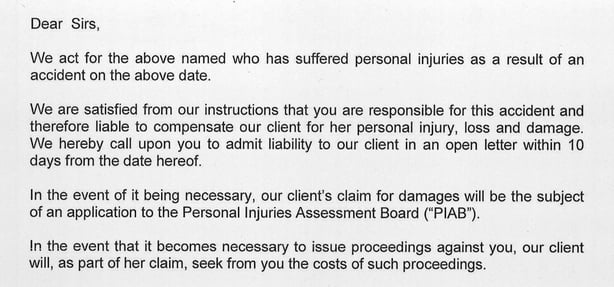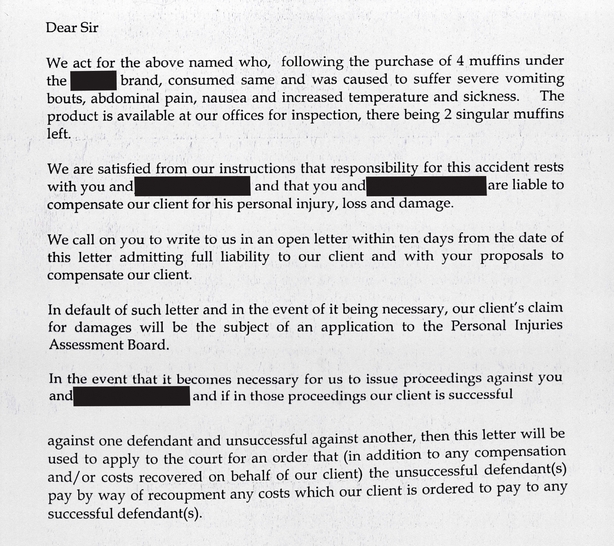Ireland’s personal injury regime is frequently accused of having excessively large court awards, especially for relatively minor injuries.
"Our members who have operations in different EU member states regularly comment that Irish claims awards are multiples of those in other jurisdictions," said a spokesman for Retail Ireland, the representative body for the retail industry in Ireland.
And at first glance, Courts Service statistics suggest the courts have become increasingly generous in recent years.
They show a substantial increase in the annual amounts the High Court has awarded in personal injury cases, from almost €22m in 2007 to €147m in 2016.
The corresponding figures for the Circuit Court show an increase from €13.5m in 2007 to €17.4m in 2016.
Those figures relate solely to awards ruled on by the courts. They don’t include settlements reached on the steps of the court.
There is, however, an important caveat: During the ten years from 2007 to 2016, there was a major increase in personal injury litigation, meaning that the numbers of court cases with awards also substantially increased.
In 2007, for instance, there were 133 High Court personal injury cases with court awards. By 2016, there were 390.
But this still means that the average High Court personal injury court award increased from €165,000 in 2007 to €377,000 in 2016.
Medical negligence
However, as the Bar Council noted in a 2016 submission to an Oireachtas Joint Committee on the cost of motor insurance, there has been a surge in medical negligence litigation in recent years, which explains in part the increase in court awards.
But the Circuit Court – which infrequently hears medical negligence cases – has also increased payouts.
The average Circuit Court personal injury award was €14,000 in 2007, which jumped to almost €18,000 in 2016, a 27% increase.
Ireland vs. the UK
In Ireland, the Book of Quantum provides a set of guidelines for the courts to rely on when considering what levels of awards are appropriate, largely based on existing levels of compensation awarded in court. Those guidelines are not mandatory and it is open to a judge to go above or below the awards ranges.
The UK equivalent is known as the Guidelines for the Assessment of General Damages in Personal Injury Cases.

The graphic above shows a small sample of awards in Ireland and the UK. Although it is not always possible to get exact comparisons in terms of how the injuries are classified, some categories are reasonably comparable.
While an Irish plaintiff can expect to receive up to €54,000 for a minor ankle fracture, the equivalent injury in the UK warrants only €14,000.
Similarly, a minor finger fracture could result in an award of only around €4,700 in the UK, but is potentially worth up to €16,600 in Ireland.
There are numerous other contrasting examples, although as the injuries become more severe, the awards in the two jurisdictions tend to converge.
Barrister Eamon Marray, who acts for defendants in personal injury cases, explained that the system for making personal injury awards is "not an exact science" and said that there are occasions where an award seems to be in excess of the fair value of the claim. But he pointed out that a defendant has the right to appeal any award that appears excessive.
Meanwhile, the differences in the two jurisdictions have been highlighted by business groups for many years, with a renewed focus in recent times.
According to Padraig Cribben, chief executive of the publican’s trade association, Vintners' Federation of Ireland, "The Book of Quantum needs to be re-visited and a new book published, taking into account international norms."
"Missed the step"
RTÉ Investigates spoke to a number of business people who said that their insurers were often quick to settle claims – even those that appeared questionable – because of a fear that if a case got to court, where things can be unpredictable, the result could be an even bigger payout.
A Dublin restaurant owner told of a recent claim, taken by a waitress, who slipped on a step in his restaurant and injured her ankle. (The restaurant owner asked not to be named because of a risk of damaging relations with his insurer.) The waitress was asked how this had happened and explained, simply, that she "missed the step."
A solicitor’s letter followed and while the restaurant owner was adamant that there hadn’t been any negligence on his part, the insurance company settled the claim for more than €60,000.
"There was literally nothing else I could do, other than carry her up the steps myself," the restaurant owner said, whose insurance premium increased as a result.
Similarly, a restaurant owner in Limerick spoke of a claim taken by an employee who spilt soup on her hand when serving a customer. Her hand blistered and she was treated at the time of the incident.
The restaurant owner's insurance company noted that he didn’t have a standard operating procedure for employees pouring soup, something that could be used against him in court. That claim was settled for €48,000.
The graphic below shows the incident report made in relation to that accident.

Below is an excerpt of the solicitor's letter sent in relation to that claim.

We also spoke to a shopkeeper in west Dublin who received claims on behalf of two young boys, who allegedly became ill after eating muffins purchased from his shop. The shopkeeper said that the muffins were purchased a day after the best-before-date. His insurance company settled the claims earlier this year for almost €9,400.
Below is an extract from the solicitor's letter he received.

Whiplash nation?
One injury particularly prevalent among personal injury claimants in Ireland is whiplash.
Around 60% of cases before the Injuries Board relate to motor liability, which estimates that around 80% of those are whiplash related. This means that around half of all reported personal injury cases in Ireland could be attributable to whiplash.
The Personal Injuries Commission said that, based on that estimate, Ireland’s "very high whiplash incidence rate" appears to be "significantly higher than those in other EU countries such as Germany and France."
And in a submission last year by the Irish College of General Practitioners to the Commission, it described "most compensated whiplash" as "frankly spurious."
A Dublin-based hotelier, Glenn McGowan, spoke to RTÉ Investigates about a recent High Court case taken against him over a whiplash-related claim.
Mr McGowan said that he was involved in a "very small tip" in 2014, with a taxi in traffic in front of him in Dublin 4.
There was "absolutely no damage done to either car," he said, adding that the female passenger in the taxi said that she was in shock but didn’t want to go to a hospital. She issued High Court proceedings two years later, claiming that she suffered back and neck injuries, which allegedly prevented her from going to the gym and going on long walks.
Earlier this year, the case was settled for €30,000.
Few cases are "purely whiplash"
Speaking in general terms, a spokesperson for the Bar Council said that there are very few cases which involve "purely whiplash injuries without other injuries and symptoms."
She also said that "compensation awarded by the Court in respect of pain and suffering should be reasonable and proportionate in all circumstances."
The spokesperson added that anyone "who sustains genuine personal injuries is entitled to be properly compensated for those injuries."
Click here to see the data we collated on personal injury in Ireland.
